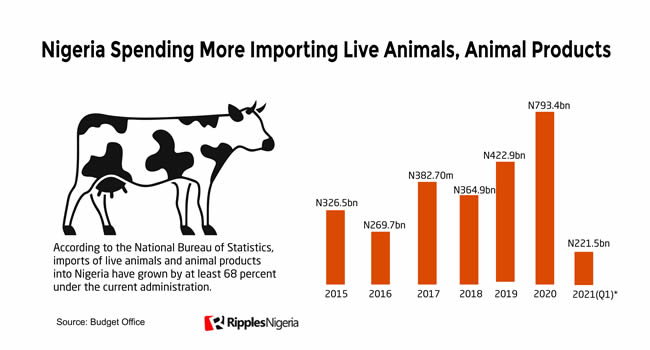Ripples Metrics
RipplesMetrics: Under Buhari, Nigeria’s importation of live animals grow by 68.4%

Despite the fact that pastoralism has lately become a big subject in the news, with reports of communal clashes and loss of lives, data show Nigeria’s spending on importing live animals has grown by 68.4 percent under the present administration.
This is according to data sourced from National Bureau of Statistics (NBS) foreign trade report data.
The term lives animals cover all living animals including domestic animals, cows, sheep, cattle, goats, and poultry intended for breeding, production of milk, meat and eggs.
Ripples Nigeria analysis of NBS report revealed Nigeria has spent a total of N2.78 trillion between 2015 and 2021(Q1) on the importation of live animals and their products such as hides and skins, an increase from N1.65 trillion spent between 2008 and 2014 during the administrations of Musa Yar’Adua and Goodluck Jonathan.
In fact, at least over N200 billion was recorded to have been spent annually on importing live animals under the current administration, with the amount reaching N793.4 billion in 2020.
Breakdown shows in 2015 the country spent N326.5 billion before dropping to N269.7 billion in 2016.
The value increased to N382.7 billion in 2017 and N364.9 billion in 2018.
The amount spent rose further to N422.9 billion in 2019.
The most recent figures for the first quarter of 2021 showed N221.59 billion has already been spent.
“The increase in the amount spent on importing live animals underscores the need for Nigeria to address its pastoral issues; how can we be importing something we have a comparative advantage in, it puts a severe strain on our foreign exchange,” Jude Ohio, an agricultural economist, told Ripples Nigeria.
“As long as our currency continues to decline and we rely on imports to satisfy our agricultural requirements, this will continue to stress the economy. I think it is high time we start addressing lingering issues that are limiting productivity,” he added.
Also in a recent note, economic analysts at United Capital attributed the rise in import bills to global inflationary pressures and currency depreciation.
READ ALSO: [RipplesMetrics] In Visuals, analysis of the domestic debt profile of Nigerian States
Ripples Nigeria had earlier reported that Nigeria was ranked by Statista to have an estimated 20.7 million cattle population, the 5th largest in the Africa.
The data company also projected cattle population will increase to 53.6 million by 2050.
Other food imports bill captured in by NBS foreign trade report showed Nigeria spent N3.94 trillion on vegetable goods imports in the last seven years, a 36.8 percent rise from N2.88 trillion spent during the previous administration.
The importation of Animal and vegetable fats and oils and other cleavage products also gulped N669.5 billion, up from N270.9 billion between 2008 and 2014.
Another is the prepared foodstuffs; beverages, spirits and vinegar; tobacco which rose to N4.65 trillion from N2.41 trillion in the corresponding period of the previous administration.
Join the conversation
Support Ripples Nigeria, hold up solutions journalism
Balanced, fearless journalism driven by data comes at huge financial costs.
As a media platform, we hold leadership accountable and will not trade the right to press freedom and free speech for a piece of cake.
If you like what we do, and are ready to uphold solutions journalism, kindly donate to the Ripples Nigeria cause.
Your support would help to ensure that citizens and institutions continue to have free access to credible and reliable information for societal development.
























